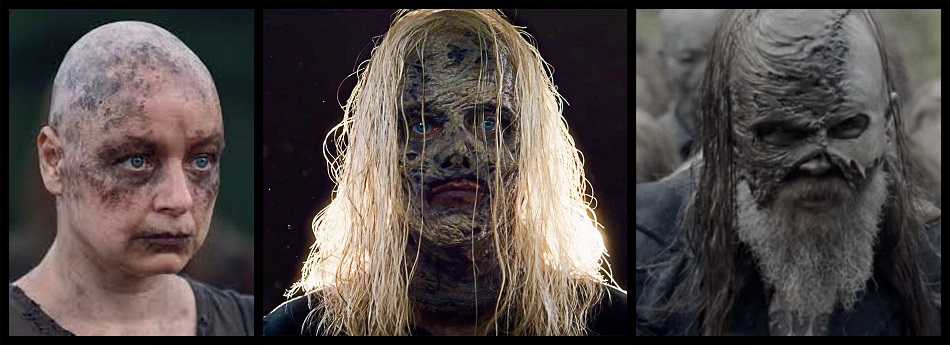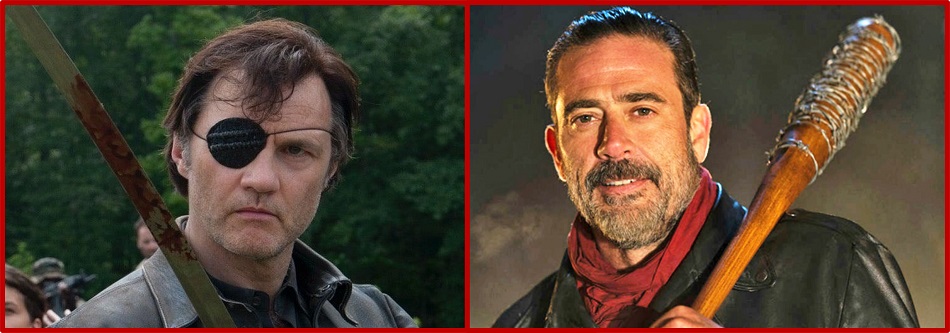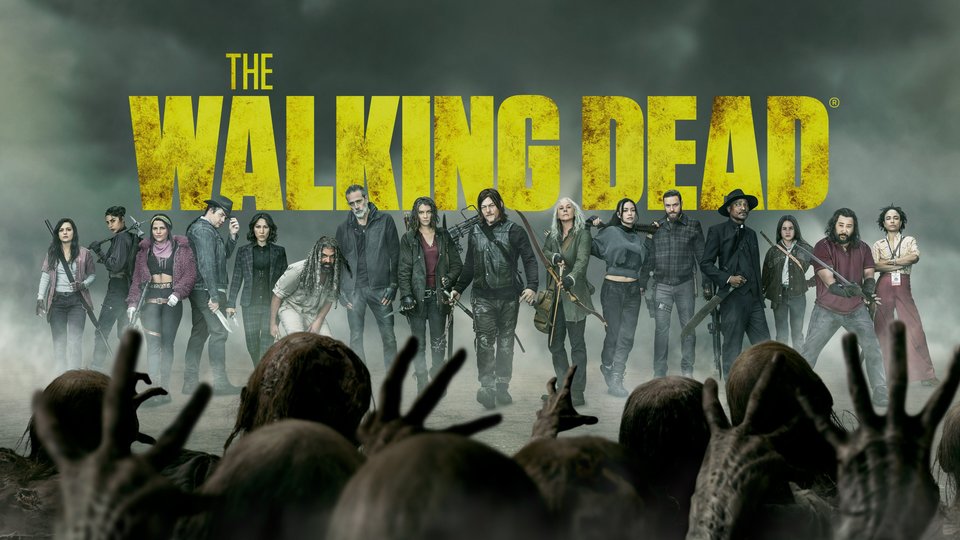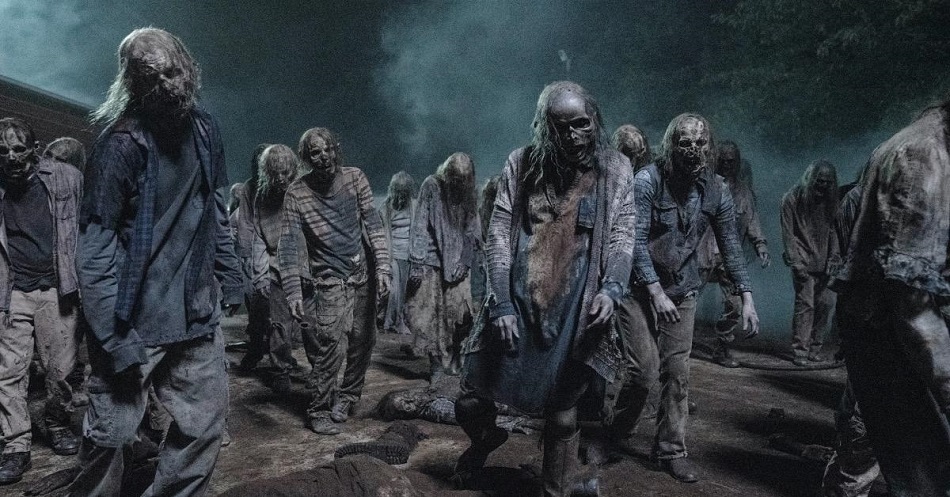Still in Hell: Some Random and Rambling Thoughts on the Final Two Seasons of The Walking Dead
The only thing more dangerous than the dead are the living
After all the praise, complaints and criticism finally subsided, I decided to watch the last two seasons of The Walking Dead, having taken a long break from the series for my own personal reasons. This is a follow-up to my 2-part article on 9 Seasons in Hell: The Walking Dead, from 2019, BC — Before Covid: 9 Seasons of Hell on Earth, Part One and 9 Seasons of Hell on Earth, Part Two. My thoughts are intended to be somewhat humorous, a bit critical, and slightly satirical. Whether I’ve succeeded or not, well, that’s up to you readers. I may be a day late and a dollar short on writing this article, but I figured there might still be a few fans of the show out there. I’ve written this article for those who have seen part of, if not all, of the TV series.
I know people who didn’t like that The Walking Dead was too character-driven. They wanted more zombie kills. It’s like they wanted Rick Grimes (Andrew Lincoln) and his posse to walk all the way from the Shire to Mordor, fighting and destroying zombie after zombie every step of the way. I also know people who, like me, loved the fact that the show was driven more by character than by plot, although a little more care in some of the later plotting would have helped the last handful of seasons. But I didn’t need every episode to be about destroying or being eaten by zombies. I enjoyed the characters and their interactions, their backstories, the dramatic situations, and the “family-type” of various storylines.
As it is, I confess to having read only the first few issues of the graphic novels, so I don’t know what happened in that series, nor do I claim to know what Kirkman, as well as the creators of the TV series were thinking, and of course what they would say to my thoughts and observations. That being said, I do know that Robert Kirkman ended TWD comic series on a happy note. Naturally, I know that those behind the cinematic version often came up with their own way of doings things and sometimes going in a different direction by way of plot, creating a few of their own characters, keeping characters that had been killed off in the graphic novels, killing off others who survived in the novels, and so on.
I’m sure I missed some things due to the distractions of life, and I may be wrong on a number of things. I did, however, go back to the first season and binge all the way to the eleventh and final season. Because I watch movies and TV shows for a variety of reasons — plot, performance, special FX, writing, cinematography, and the whole filmmaking process, I did another rewatch of the special DVD features, as well as those episodes with commentaries. It only took me a couple of weeks.
SEASON 10
First, I must say that I am still a fan of the show. Sure, each season had some slow and weak episodes and scenes. This season had a number of great episodes and many excellent moments, and it ramped up some of the weakness of the previous season, as well as ending a few lingering story arcs, while bringing in yet another threat from a strange community of feral humans known as the Whisperers. I liked that they didn’t overplay the whole arc of the Whisperers and brought it to a nice finish. As for the Here’s Negan episode . . . it felt more like a Bonus DVD Feature. Yeah, I get that Negan (the legendary Jeffrey Dean Morgan) needed a backstory, but I thought it was rather lukewarm. Too rushed. Not to my liking.
I did like the Whisperers, however, who were first introduced in Season 9. I like their motto, too:
We walk in darkness. We are free. We bathe in blood. We are free. We love nothing. We are free. We fear nothing. We are free. We need no words. We are free. We embrace all death. We are free. This is the end of the world. Now is the end of the world. We are the end of the world.
They call the Walkers “Guardians,” and carve off the faces of the dead to wear as masks. Thus, looking, acting and smelling like the Walkers, and whispering to each other when they communicated, they could walk safely amongst the zombies, even leading and herding them together. That’s how they exist, by pretending to be the living dead.
Their leader, known as Alpha (formerly Dee) is chillingly portrayed by actress Samantha Morton, who with her bald head, Alice Cooper eyes and darkly-painted lips is one scary psycho-mama. Truth is, she was always off her nut, as seen in flashbacks telling the story of her, her husband, and their daughter Lydia, who later becomes a pawn in the game of survival played out between the Whisperers and the Hilltop Community.
Alpha’s second in command, Beta (nicely played by Ryan Hurst) is a giant of a man and a true menace, who is even more intimidating because her never removes his mask. The final episodes of Season 10 ended on some sad and chilling moments. So much tragedy and horror brought on not by the Walkers alone, but by the Whisperers, who have lost their humanity and even their souls.
We walk in darkness. We are free. We bathe in blood. We are free. We love nothing.
We are free. We fear nothing. We are free.
We need no words. We are free. We embrace all death. We are free.
This is the end of the world. Now is the end of the world. We are the end of the world.

SEASON 11
While I thought the whole Woodbury/Governor arc from earlier seasons went on a bit too long, I appreciated the fact that this final season’s Commonwealth storyline did not wear out its welcome. I did, however, think that this community of some 50,000 survivors bore too much in common with the smaller, Woodbury community, and that it was also ruled by a Governor. This community is, however, more of a militaristic state, hiding the underlying and age-old theme of the “haves and the have nots” beneath a façade of democracy, when in truth it’s a fascist society. The security force, dressed in what looks like Stormtrooper costumes from Star Wars rejected by George Lucas before production began.
Thankfully, this storyline lasted for only the one and final season, with few surprises and some very standard villains, especially the spoiled brat son of the Governor — an arrogant SOB with mommy issues. Happily, he comes to a tragic end, even though he tries to reform. But it’s a little too late for that. As always, the performances are outstanding. I loved the whacky but tough-as-nails character of Juanita Sanchez, who prefers to be called Princess, and was first introduced at the tail end of Season 10. She’s beautifully portrayed by Chicago actress Paola Lázaro, who attended the same high school I did — Lane Tech, although I had already been gone twelve years before she enrolled in 1982.
While this final season ended on a somewhat happy note, with people from the Commonwealth joining the community of Alexandria, and with Judith Grimes (played by the wonderful Cailey Fleming) doing voiceover for a number of images flashing back to all the earlier episodes, I was left hanging. I wanted more closure. The reason for the resurrection of the dead was never explained (I suppose this and other questions may be answered in spin-off series, if at all. But I think the planned trilogy of films has been shelved.) We get only a few hints of what became of Rick Grimes after Anne/Jadis (Pollyanna McIntosh) took him away in a helicopter. And we are teased with a few scenes showing Michone (another of the series’ big break-out stars, Danai Gurira) on the trail of Rick, after taking off to find him, refusing to believe he was dead, especially after finding his boots and useless smart phone aboard an abandoned ship.
Truth be told, I did not want a happy ending. I wanted to see the total extinction of Mankind, with a world inhabited by the Dead until they eventually rotted away and disintegrated, leaving Mother Nature to heal the world and leave it to the birds and beast of the field, as it was before Man took over and spoiled the planet. Or maybe have Rick the sole surviving human in the world, wandering about, lost and insane, until he reaches his final destination and is surrounded by thousands of Walkers. Maybe he is the Lone Walker, as seen in the opening title sequences in a number of the early episodes.
In the final analysis, The Walking Dead finale did not satisfy me. It left me wanting at least one more season and a better ending. In spite of that, what I admired was the epic scope of the series and how it was filmed as more of a theatrical production than a TV series. I like the series because it’s more character-driven than plot-driven, and I never found fault with any of the actors: the performances were all spot-on and in many cases, quite powerful. The Special FX are also excellent; with Greg Nicotero at the helm, I knew I was in good hands.
As for production values, with Frank Darabont and Gale Anne Hurd behind it, I expected no less. And the state of Georgia was a perfect location, a character itself. (Zombieland was partially filmed in GA, and there are scenes in that film that echo panels from the TWD graphic novels, which are again echoed in the TWD series.)
For me, the show had a lot of emotion, tragedy and heartbreaking moments. They played it straight and never once broke the suspension of disbelief by referring to other zombie films like George Romero’s Living Dead series, although his shadow hung over the entire eleven seasons. The term zombie is never mentioned in the series. As I was told by an author who is friends with one of the show’s writers . . . in the universe of The Walking Dead, there are no zombie films, and the word zombie does not exist, and so it’s never mentioned in the show. I listened, I watched, but I did not hear it. I could have missed that. Romero never used the term in his early films, although I think it was in Land of the Dead when a character refers to the Living Dead as zombies.

AN APOCALYPTIC MORALITY TALE
I always tell people that the show is not about the zombies, it’s about the total collapse of society and civilization. The zombies are basically the “horror gag,” the blood and guts of what at heart is a horror series. TWD just as easily could have been about nuclear holocaust, a pandemic or alien invaders. The whole premise is about to what lengths people will go in order to survive, in order to build new communities and a new society. Every character has suffered at least one tragedy, and they’re all traumatized and broken and, in many cases, they’ve pretty much gone insane due to fear and personal loss of friends, family and loved ones.
This is also a war story — a war between Living and the Dead, as well as a war between the human survivors. In war, good people will do bad things, either by choice or necessity . . . and bad people will do even worse. The heroes consider themselves to be the good guys, while the villains see themselves as the good guys. No one is perfect. Everyone makes mistakes. Choices made far too often result in the deaths of a lot of people. The Walkers are indeed far less dangerous than humans. We know what they want, and there is no guile within them, no secret agenda: you can trust in the fact that they only want to eat us. As for the Living . . . Trust. No. One.
As most of us know, every life affects the lives of others. If Rick had killed Negan, then Negan wouldn’t have been there to save Judith during the blizzard. If Negan had been killed, who would have had the savvy to infiltrate the Whisperers and kill Alpha? Likewise, without Negan, would Daryll (the heroic Norman Reedus) have been able to kill Beta all by his lonesome? And Negan was a total badass, as well as a fairly good man who lost his moral compass. He was smart, too, and confident. But geeky-nerdy Eugene (brilliantly portrayed by Josh McDermitt) was much smarter and had Negan fooled almost from the get-go.
In this zombie apocalypse world, good people discover the demon inside them, and bad people come to discover the angels of their better angels. But no one is left unaffected by the end of the world as they knew it. The show expertly captures the human condition, man’s cruelty and brutality, man’s hunger for power, and man’s inhumanity to man. Overall, I enjoyed TWD. I know many people who did, too, and many who abandoned the show after a few seasons, especially after the grisly deaths of fan favorites Glenn (Steven Yuen) and Abraham (Michael Cudlitz.)
Since everyone is infected by the “resurrection virus,” as I call it, the Living are also the Walking Dead. “We are all infected,” Rick tells his group at one point, after he learns the truth from the CDC’s Doctor Jenner, played in one episode by Noah Emmerich. So there will always be zombies, unless the brain is skewered once a person dies of whatever natural or unnatural cause takes them out. Hey, maybe they could have done a mash-up between The Walking Dead and the Resident Evil films. The Umbrella Corporation’s T-Virus could explain it all: they were experimenting with resurrecting the dead to be used as a cheap labor force; slave labor, if you will, as in Keven Anderson’s excellent novel, Resurrection, Inc. But the experiment goes horribly wrong, escapes into the atmosphere, and voila — Zombie Apocalypse! Imagine Alice (Milla Jovovich) joining the cast and teaming up with Michone and Carol (my favorite, Michelle McBride) in a last stand, battling the herds and hordes of Walkers to the death.
SOME FINALE THOUGHTS
In the early episodes, the Walkers moved fast, but later on they slowed down a bit. A few even showed signs of intelligence: in a nod to the original Dawn of the Dead, while Rick, Glenn and the gang are holed up in a department store, a Walker picks up a rock and uses it to break one of the glass doors. Also, a few Walkers remembered how to climb a ladder, something Aaron did not seem to know because he mentions it in a Season 11 episode, after a Walker climbs a ladder; he also wonders if the Dead are starting to remember . . . which I always suspected they would eventually do: slowly begin to evolve. Stephen King’s Cell dealt with the evolution of the “cell-phone zombies” quite chillingly, although the novel never had a real ending: the future did not bode well for the living. The dead will always be with us.
Walker Waste: no one discusses this. Since Walkers eat the Living, and we know there is food in their stomachs . . . where did they poop and why didn’t the Living use trails of Walker poop to tell them where NOT to go — or where to go when hunting them? I know in Max Brooks’ novel, World War Z, the whole issue of zombie digestion and waste byproduct has been addressed. Also, do Walkers pee? Maybe not. We never see them drink anything, although feasting on bloody flesh might be considered a way of ingesting fluids.
Some of the most repeated lines: You don’t get to do that. They don’t get to do that. That’s on me. That’s on you. You wanna do this now? And there were too many instances of people being saved in the “nick of time.” That quickly became quite predictable.
Did I miss something? In Season 10, Michone tells Aaron (Ross Marquand) that the Whisperers have a nuclear weapon. What nuclear weapon? Was she referring to the Guardian Walkers?
One thing I learned from the show is that the Walking Dead do sleep, go dormant or at least rest until aroused by noise or the scent of blood. I wonder what dreams they dream? “Do Walkers Dream of Living Manmeat?” (In the very low-budget film, Abraham Lincoln vs Zombies, the zombies are really bland and seem somewhat dumb, and they stand around as if mesmerized, almost like statues, until aroused by noise or if they glimpse movement. The only good things I can say about this film is that Bill Oberst Jr turned in a nice performance as Honest Abe, and the film’s best moment is the ending, an ending I did not foresee.)
“Don’t get blood in your eyes!” Well, I don’t know if that was a plot point that was later dropped or just something Rick warned people about. Sure were enough people who got walker blood in their eyes and even in their mouths! And then there was the “Tainted meat!” thing. What happened with that plot point? The last of the Terminus cannibals didn’t get sick, die and come back after eating the leg of Bob (Lawrence Gilliard Jr.) And lest we forget, what about the pigs the Kingdom was secretly trading to the Sanctuary? They were fed a steady diet of zombie chow. No Savior got sick from eating that tainted pork. Oh, maybe cooking Bob’s leg and cooking those pigs killed the resurrection virus in the meat. You tell me.
I know there were a number of medics and physicians in the show, but I do not recall any mention of dentists. Which leaves me wondering: how could so many people have perfectly good, white teeth? Seems most of the heroes have “Hollywood teeth,” while most of the villains really should have practiced better oral hygiene.
If not destroyed, do Walkers eventually rot away and die a second time? Certain scenes and images suggested that they do. In spite of “Doctor Frankenstein’s” comments in the original Day of the Dead, that the Dead take no nourishment from the flesh they eat — they eat due to sheer instinctive habits and behavior — I believe the Dead need to eat out of necessity, and if deprived of living flesh and/or brains for a long enough period of time, they’d rot completely away and fall to pieces. In one of the Resident Evil DVD commentaries, it is mentioned that the T-Virus zombies do eventually rot.
Anyway, in spite of its flaws and missteps, and often overly drawn-out storylines, I’m still a fan. The entire cast gave solid performances. These wonderful actors and actresses made the show — they are the series’ strength and high points, no matter how weak the episode. Many of them became favorites of mine, characters I liked and cared about, characters I loved to hate.
Well, everyone has their own thoughts and opinions, and these are mine. Some of you liked the show, some of you hated it. Some gave up on it after a few seasons. Some stuck with it to the very end. All I did was take a break.
The final episode of Season 11, titled “Rest in Peace,” gives us somewhat of a happy ending. Things are peaceful and all’s well in Alexandria, and everyone seems happy. But the Walkers are still out there. As Daryll might say, “Enjoy what you got while you got it because all y’all are still in hell.” Indeed!
By the way, if you’re a fan of George Romero’s Living Dead films, I highly recommend two fantastic anthologies assembled and edited by John Skipp and Craig Spencer, featuring a host of famous and near-famous authors who pick up where Romero left off: Book of the Dead and Still Dead: Book of the Dead 2
Happy munching, and thank you!
Joe Bonadonna
Joe Bonadonna is the author of the heroic fantasies Mad Shadows—Book One: The Weird Tales of Dorgo the Dowser (winner of the 2017 Golden Book Readers’ Choice Award for Fantasy); Mad Shadows — Book Two: The Order of the Serpent; Mad Shadows—Book Three: The Heroes of Echo Gate; the space opera Three Against The Stars and its sequel, the sword and planet space adventure, The MechMen of Canis-9; and the sword & sorcery pirate novel, Waters of Darkness, in collaboration with David C. Smith. With co-writer Erika M Szabo, he penned Three Ghosts in a Black Pumpkin (winner of the 2017 Golden Books Judge’s Choice Award for Children’s Fantasy), and its sequel, The Power of the Sapphire Wand. He also has stories appearing in: Azieran: Artifacts and Relics; Savage Realms Monthly (March 2022); Griots 2: Sisters of the Spear; Heroika I: Dragon Eaters; Poets in Hell; Doctors in Hell; Pirates in Hell; Lovers in Hell; Mystics in Hell; Liars in Hell; Sinbad: The New Voyages, Volume 4; Unbreakable Ink; Stand Together — A Collection of Poems and Short Stories for Ukraine; the shared-world anthology Sha’Daa: Toys, in collaboration with author Shebat Legion; and with David C. Smith for the shared-universe anthology, The Lost Empire of Sol. In addition to his fiction, Joe has written numerous articles, book reviews and author interviews for Black Gate online magazine.
Visit Joe’s Amazon Author’s page!

